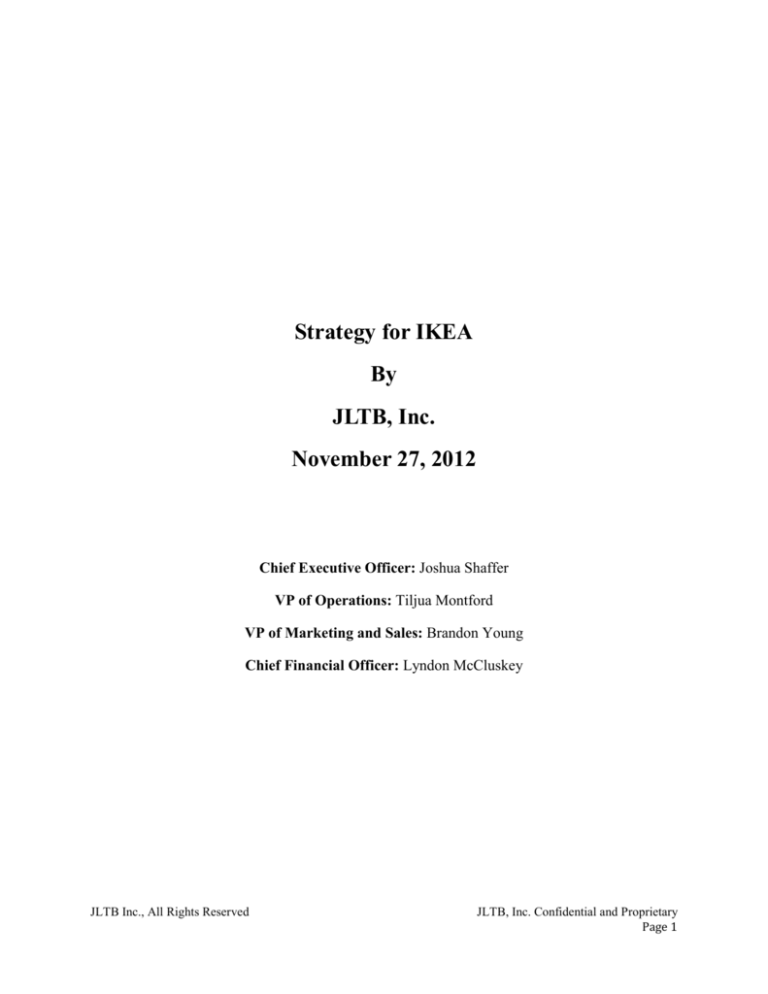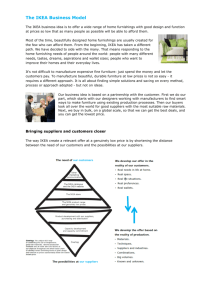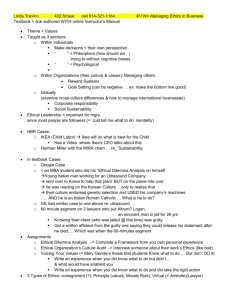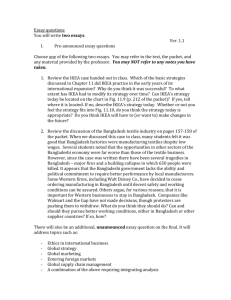
Strategy for IKEA
By
JLTB, Inc.
November 27, 2012
Chief Executive Officer: Joshua Shaffer
VP of Operations: Tiljua Montford
VP of Marketing and Sales: Brandon Young
Chief Financial Officer: Lyndon McCluskey
JLTB Inc., All Rights Reserved
JLTB, Inc. Confidential and Proprietary
Page 1
Contents
Introduction ................................................................................................................3
SWOT Analysis ..........................................................................................................4
Internal Factor Evaluation Matrix…………………………………...……………..5
External Factor Evaluation Matrix…………………………………………………6
Proposed Actions........................................................................................................7
Summary .................................................................................................................. 11
Contact Information .................................................................................................12
JLTB Inc., All Rights Reserved
JLTB, Inc. Confidential and Proprietary
Page 2
Introduction
Who We Are
JLTB Consulting, Inc. is a company established in 2000 by founder and Chief Executive Officer
Joshua Shaffer. JLTB is based in Atlanta, Georgia, but has offices established in Dallas, San
Diego and New York City. JLTB is active in many Georgia communities, contributing to
prostate cancer research, breast cancer research, and the Go Green initiative JLTB Consulting,
Inc. is a business consulting firm, which specializes in retail management and entrepreneurship.
Opportunity Statement
IKEA has had an incredible global presence since its inception in 1933 by Ingvar Kamprad.
After IKEA entered the United States in 1985 (Philadelphia), many challenges posed potential
issues for the company. In 2002, as the world’s top furniture retailer, which boasted an annual
sales report of twelve billion dollars, IKEA was ready to expand operations in the United States
beyond its limited existing stores. In 2012, IKEA was ranked number 28 on the Interbrand
Global Top 100 brands list. Although IKEA has an amazing global presence (301 IKEA stores
in 37 countries) and a reputable presence in the United States (38 stores), IKEA owns a very
small share of the market share for furniture retailers in the United States.
JLTB, Inc. is proposing a viable market-development and market penetration strategy for
IKEA’s operations in the United States. We recommend this strategy through a two-pronged
approach, with emphasis on the following areas of focus:
Market expansion
Retail management strategy
JLTB Inc., All Rights Reserved
JLTB, Inc. Confidential and Proprietary
Page 3
SWOT Analysis
Strengths - S
SO
Strategy
WO
Strategy
ST
Strategy
WT
Strategy
Use strengths to
take advantage of 1 Top 100 Global Brands
opportunities
by Interbrand for 2012
(#28)
Overcome
2
38 “blue” IKEA-owned
weaknesses by
stores in U.S.
taking advantage
of opportunities
3 $2.9 billion revenue made
Use strengths to
in US annually.
reduce threats
Minimize
weaknesses and
reduce threats
Opportunities – O
1 Market penetration
through market
development and
expansion.
2 Job creation, help local
economies, tax breaks.
3
Weaknesses – W
1 Not meeting customer
expectations.
2 Cost of expansion in
North America.
3 Available resources in
new locations.
4 Employs 11,000 US
workers.
SO Strategy
Reputation for good
employment practices
throughout the U.S. will
provide easy transition
into new cities.
WO Strategy
Increased revenue/return
on investment (ROI) will
overcome any additional
cost of expansion (long
term).
Increase revenue.
Threats - T
1
Local furniture retailers.
2
Damage to IKEA brand
if new locations fail.
3
Local restrictions.
JLTB Inc., All Rights Reserved
ST Strategy
Brand awareness due to
Interbrand Global Top
100 listing will limit
damage to brand in case
of failure and will give
IKEA competitive
advantage over local
stores.
WT Strategy
Minimize possibility of
not meeting customer
expectations, preserve
brand equity and limit
possibility of new
locations failing with a
strong advertising
campaign focused on
local communities and
customer service.
JLTB, Inc. Confidential and Proprietary
Page 4
Internal Factor Evaluation Matrix
IKEA
Key Internal Factors
Weights
Rating
Weighted Score
Internal Strengths
1. Top 100 global brands by Interbrand 2012 (#28).
0.18
4
0.72
2. 38 “blue” IKEA-owned stores in the U.S.
0.15
3
0.45
0.2
4
0.8
0.14
3
0.42
1. Not meeting customer expectations.
0.07
2
0.14
2. Cost of expansion in North America.
0.15
2
0.3
3. Available resources in new locations.
0.11
1
0.11
3. $2.9 billion revenue made in US annually.
4. Employ 11,000 U.S. workers.
Internal Weaknesses
0
0
0
0
0
0
0
Totals
JLTB Inc., All Rights Reserved
1
2.94
JLTB, Inc. Confidential and Proprietary
Page 5
External Factor Evaluation Matrix
IKEA
Key External Factors
Weights
Rating
Weighted Score
1. Local furniture retailers.
0.18
2
0.36
2. Damage to IKEA brand if new locations fail.
0.15
2
0.3
3.Local restrictions
0.14
1
0.14
0.15
4
0.6
0.2
3
0.6
0.18
4
0.72
External Threats
External Opportunities
1. Market penetration through market development/expansion.
2. Job creation; help local economies, tax breaks.
3. Increase revenue.
0
0
0
0
0
0
Totals
JLTB Inc., All Rights Reserved
1
JLTB, Inc. Confidential and Proprietary
Page 6
2.72
Proposed Actions
IKEA United States Red Store Strategy
Our proposed strategy for market development and expansion begins with a “Red Store
Strategy.” Out of the 301 IKEA stores in 37 countries around the world, the IKEA group owns
267 stores in 25 countries. For purposes of distinction, these IKEA group-owned stores are
known as “blue” stores. The other 34 stores are owned by franchisees outside of the IKEA group
in 16 different countries (ikea.com). In the United States, all IKEA stores are owned and
operated by the IKEA group; in other words, all U.S. stores are “blue” stores. Because IKEA
has not yet achieved market penetration in the United States, expansion of blue stores is difficult,
and often characterized by limitations. For example, in North America, IKEA requires that for a
blue store to be opened, the proposed city (including surrounding suburban areas) must exceed a
minimum population of one million people. Any fewer people may be considered to pose too
much inherent risk for the company, and therefore not viable.
To achieve market expansion without the acceptance of excessive inherent risk, JLTB proposes
the following recommended actions:
Opening of 5 new IKEA “red” stores by qualified franchisees in selected cities.
Parameters for qualifying cities would include a minimum population of 500,000 people,
not to exceed 1,000,000 people.
Division of “Tier 1” and “Tier 2” cities, based on priority.
Selected action for expansion would be 1 year for Tier 1 cities and no more than 3 years
total for remainder of Tier 2 cities.
JLTB Inc., All Rights Reserved
JLTB, Inc. Confidential and Proprietary
Page 7
Based on market analysis, local economies and population, the following cities are recommended
for expansion:
Tier 1 locations:
Jacksonville, Florida: population 827,908
Indianapolis, Indiana: population 827,609
Tier 2 locations:
Milwaukee, Wisconsin: population 597,867
Oklahoma City, Oklahoma: population 591,967
Nashville, Tennessee: population 590,807
JLTB Inc., All Rights Reserved
JLTB, Inc. Confidential and Proprietary
Page 8
Figure 1: Proposed new “red store” locations for IKEA United
States
JLTB Inc., All Rights Reserved
JLTB, Inc. Confidential and Proprietary
Page 9
IKEA Limited Stores Retailing Strategy
Our second recommended action entails a slightly different approach for IKEA in which IKEA,
Inc. offers a brand extension of its already highly global brand, to be known as IKEA Limited.
Creation of IKEA Limited stores will focus on achieving market penetration by gaining
competitors’ customers, attracting non-users of the IKEA brand, and by enticing IKEA brandloyal customers to shop at IKEA more. IKEA will be able to accomplish this market penetration
by infiltrating smaller areas which may not normally be affected by IKEA. The following
constraints are suggested for IKEA Limited stores:
Select cities with populations between 300,000 and 499,999.
IKEA Limited stores will be IKEA-group owned.
Exact same retail layout as full-sized IKEA stores.
75% of product offerings of normal IKEA stores (remaining 25% will be available for
online-to-store delivery).
75% of square footage of normal IKEA “blue” stores.
Specific locations decided at the discretion of IKEA group.
JLTB Inc., All Rights Reserved
JLTB, Inc. Confidential and Proprietary
Page 10
Summary of Benefits to Strategy
Short Term
Market expansion
Increased brand awareness/brand equity
Broadened customer base
Stimulate local economies
Tax breaks
Long Term
Market penetration in the United States
Increased market share
Exponential revenue increases in the United States
Conversion of red stores to IKEA owned blue stores
Expansion of distribution channels
JLTB Inc., All Rights Reserved
JLTB, Inc. Confidential and Proprietary
Page 11
Please feel free to contact us if you have any questions.
Contact Information
Joshua Shaffer, CEO
JLTB, Inc.
3219 College Street
Savannah, GA 31404
Email: jmshaffer9707@hotmail.com
Phone #: 760-908-8741
www.jltbconsulting.com
JLTB Inc., All Rights Reserved
JLTB, Inc. Confidential and Proprietary
Page 12






